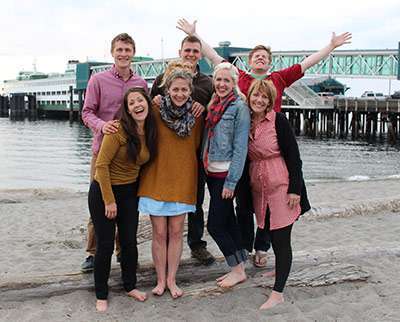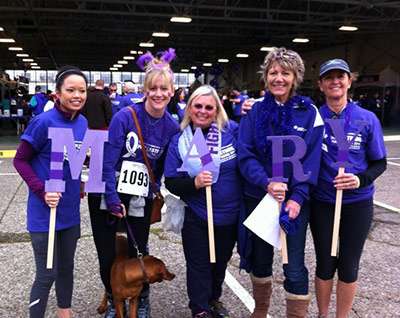Clinical Trials Offer “Our Best Hope”

Survivor Mary Cranny.
When Mary Cranny of Seattle, Wash., was diagnosed with stage III pancreatic cancer in April 2013, she needed some time to process the news. Cranny had lost her mother to the disease 10 years prior, after only a three-month battle. And just one month away, she was looking forward to celebrating her daughter’s wedding.
“I had to be there for my daughter,” Cranny reflected. “Yet, I didn’t want the attention to be on me, which is why I depended completely on my doctors at that time.”
Within a week of diagnosis, Cranny began her chemotherapy treatments. When the idea of clinical trials was first presented, she remembers feeling afraid. “I was scared that I would get a placebo. And I thought I would be treated like a guinea pig.”

Mary with her family.
“But, that’s not what happens,” Cranny realized once she began the trial. “My wellness was the clear goal, so I wasn’t placed in harm’s way.” She regards her experience with clinical trials as excellent and feels that they provide “our best hope.”
Cranny’s treatments during the trial were able to shrink her tumor enough that she became eligible for a Whipple surgical procedure. Today, three years after her diagnosis, she is feeling great and no longer undergoing any treatment.

Mary participating in PurpleStride Seattle.
If you or someone you love is facing pancreatic cancer, we strongly encourage you to consider clinical trials every time you make a treatment decision, including at diagnosis. Clinical trials give patients early access to cutting-edge treatments that can lead to better outcomes, progress in research and improved treatment options for more patients.
The Pancreatic Cancer Action Network maintains the most comprehensive and up-to-date database of pancreatic cancer clinical trials available in the United States. Start your own clinical trial search on our easy-to-use Clinical Trial Finder.















